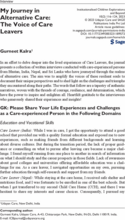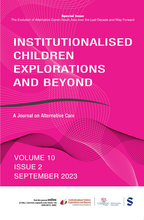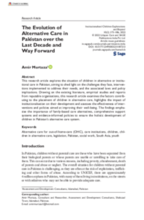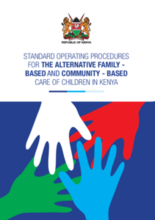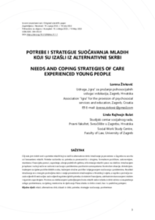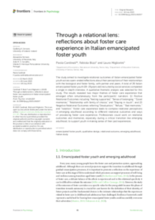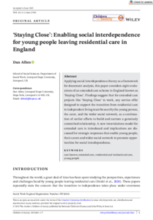Displaying 71 - 80 of 991
This is a series of written interviews conducted with care-experienced persons from Bhutan, India, Nepal and Sri Lanka who have had experience with alternative care. These interviews were published in the September 2023 issue of the Institutionalised Children Explorations and Beyond journal.
Based on the literature and observation, this article explores ideas on the alternative care of children, particularly relating to its modalities and challenges in the context of Bangladesh. The authors opine that the children’s best interest cannot be achieved when a group grows without quality care.
This research article explores the situation of children in alternative or institutional care in Pakistan, aiming to shed light on the challenges they face, interventions implemented to address their needs, and the associated laws and policy implications.
This article will present the evolution of alternative care provision in the Maldives.
The Standard Operating Procedures (SOPs) for the Alternative Family-based and Community-based Care of Children in Kenya provide guidance for the comprehensive implementation of the Guidelines for Alternative Family Care for Children in Kenya (2014).
This is a practical guide for the social workforce from the State, Civil Society Organisations and NGOs working with children separated from their families and being placed in residential care institutions or in other forms of alternative care in Haiti. This ISS publication draws on case studies and best practices from various experiences in Haiti and abroad in the field of family reintegration.
Ce Guide Technique pour la Réintégration Familiale en Haïti se veut un guide pratique pour les travailleurs sociaux de l’Etat, des Organisations de la Société Civile et des ONG travaillant avec les enfants séparés de leurs familles et placés en Maison d’Enfants ou en d’autres dispositifs de protection de remplacement en Haïti.
The main aim of this paper is to gain insight into the needs of youth who have left alternative care in the social welfare system. The study was conducted in Zagreb, Croatia, on a sample of sixteen young people.
This study aimed to investigate relational outcomes of Italian emancipated foster youth across open-ended reflections about their perceptions of their relationships with the biological and foster family, with partner and peers.
This paper considers eight evaluations of an extended care scheme in England known as ‘Staying Close’. Findings suggest that for extended care projects like ‘Staying Close’ to work, any service offer designed to support the transition from residential care to independent living must be seen by the young person, the carer, and the wider social network, as a continuation of earlier efforts to build and nurture a genuinely committed relationship.

